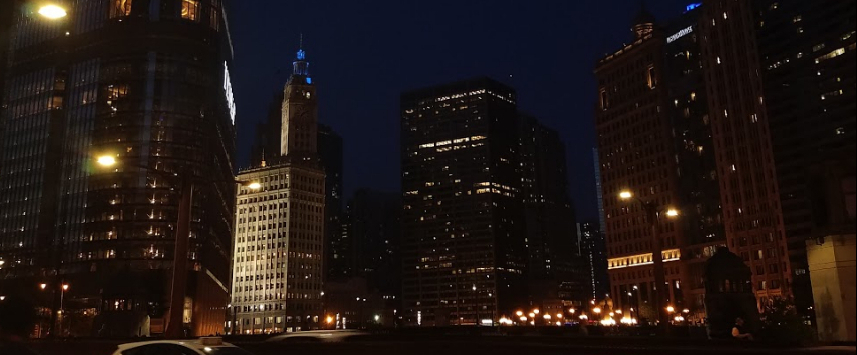This past April, North Park held the first-ever Cornerstone Writing Awards, an event that recognized exemplary first-year student writing in four categories: "Comparison," "Analysis," "Narrative," and "Reflective." Winning writers received a $100 prize as well as the opportunity to read their work to an audience comprised of Cornerstone peers and faculty.
This essay was the winner of the Comparison category.
Paper 3
Written in 1909, E.M Forster’s short story “The Machine Stops” depicts a dystopian future of environmental devastation and technological overreach. Forster suggests the possible fate humanity faces if they look to machines to guide them through life and do man’s work for them. In the story, the human race has become solely reliant on machinery to provide shelter, food, medicine, and all entertainment requested. The machine that was built by man has become the leader, dictator, and religious figure over him. Although Forster’s story was not a prediction of the future, he does make solid suggestions that are still relevant to human kind more than one hundred years later. The Machine Stops, by E.M. Forster detects that technological overreach is the cause of the destruction of mankind by severing the connections humans have with one another and the connection humans have with nature.
The story shows evidence that the advancement of technology is a definite threat to human contact by causing physical separation between beings. One major example is the conversation Vashti has with her son, Kuno through the machine (Forster 2). These two relatives live in their own, identical rooms halfway across the world, which was chosen by the Machine. It is pretty difficult to see someone when they have been assigned to the other side of the earth. In this world, visitation and face to face contact is looked down upon since the Machine is so far advanced, and anyone can be reached with the click of a button. No one yearns to actually meet in person, until Kuno. Each individual is to stay in their cell and speak into a speaking tube if they wish to “connect” with a friend or family member. Each individual has everything they possibly need, isolated in their honeycomb cell, so they do not ever need to leave their rooms unless calling for an airship. In this world, one does not bring themselves to their wants but brings their wants to themselves. In this story, it is enough to merely see someone through the machine rather than waste time to meet in person. Another example is when Vashti loses her balance on the airship and the attendant reaches out her hand to stabilize her which disturbs Vashti. The moment Vashti becomes angry, she shouts in rage, “How dare you! exclaimed the passenger. “You forget yourself!” The woman was confused, and apologized for not have letting her fall. People never touched one another. The custom had become obsolete, owing to the Machine” (Forster 8). The attendant was trying to help Vashti and held her hand as a sign of compassion for another being and was shut down immediately. Human contact is no longer a sign of compassion, intimacy, or love, but an insult to the people of this time. Physical contact is such an insult that someone would rather fall than have another’s flesh touch them for support. A third example of the destruction of human interaction would be the rules the Machine states on parenting. “But she thought of Kuno as a baby, his birth, his removal to the public nurseries, her own visit to him there, his visits to her--visits which stopped when the Machine had assigned him a room on the other side of the earth. “Parents, duties of,” said the book of the Machine,” cease at the moment of birth” (Forster 6). Parents do not even have the authority to raise their children. Mothers carry their children, not the machine, but the machine still has the power to take them away. Parents and children never have the chance to develop a physical connection or bond as they grow.
This story also suggests evidence that the advancement of technology plays a threat to man’s connection with nature. The first example of such an idea lies in the beginning of the first conversation between Vashti and Kuno when Vashti states, “But no advantage. The surface of the earth is only dust and mud, no advantage. The surface of the earth is only dust and mud, no life remains on it, and you would need a respirator, or the cold of the outer air would kill you. One dies immediately in the outer air” (Forster 3). The earth has been completely depleted of its resources. The air itself is deadly to be in contact with. Man did not appreciate the earth enough to sustain it but rather make a new home underneath it. As machinery advanced, the earth became less valuable and humankind lost the sense of connection to the earth as a home, a beauty, a wonder. Another example is the view of the remaining wonders on the earth. When Vashti is on the airship and sees the Himalayas, beautiful, enormous creations, she simply states, “Cover the window, please. These mountains give me no ideas” (Forster 9). Vashti is flying over something as magnificent as the Himalayas and is not impressed in even the slightest manner. She has no appreciation, imagination, or even a natural curiosity for these formations and makes it so that they are hidden from her sight. Anything that does not stir ideas in this world is disregarded as useless. A final example of the destruction of the relationship between man and nature would be at the very end when it is discovered that the earth is in fact inhabitable. At the end of the short story, when Vashti asks Juno if there really is life on earth, he replies with, “I have seen them, spoken to them, loved them. They are hiding in the midst and the ferns until our civilization stops. Today they are Homeless--tomorrow--” (Forster 22). The idea of living on earth, such as the generations before, had become so absurd that it was unbelievable that any life could sustain. The idea of the earth producing life, it’s original job, was also unbelievable to the people of this time. The earth, the natural home for humans, had been so overlooked and underappreciated that there was never a desire to try to restore it. This surface was the natural, desired host for humans, but they never even wished to return.
The claims in The Machine Stops are still extremely plausible to today. As stated above, Forster’s work was not intended to be a prediction of the future, but it has so consequently aligned to the current reality. The world today is swarming with new technological breakthroughs, machines, and devices that are all created with the incentive to “advance” humanity. The advancement of technology, while outstanding, somes with some setbacks. Humanity seems to have loss sense with physical interaction and the appreciation of nature. Smartphones especially are a cause of destruction. Smartphones in today’s world are much similar to the machine in The Machine Stops. Smartphones allow individuals to connect with friends and family members, obtain requested information, allow for virtual face to face conversation, without any physical connection, just as the machine. They also both offer a sense of distraction. When Vashti was troubled by her son’s request to visit and left with a feeling of loneliness, instead of pondering their argument, his words, thoughts, and purposes, she looked to the machine and all of its glory. She decided to turn off her isolation switch and answer meaningless questions from her friends, so she could avoid such difficult thinking. This is a trend seen daily in today’s world but goes by the name of social media. When troubled, individuals look to their smartphones or devices that promise to connect them with friends and family when bored, troubled, sad, or lonely. It acts as a temporary fill for the void felt at that moment, but merely acts as a distraction. If it was not the Machine being worshiped in the story, it was the book of the Machine. The book, also like smartphones today, are taken everywhere an individual go. They provide a sense of comfort to the individual. Looking at the world today, one could definitely reason that there has been a loss of appreciation for the earth with signs of pollution and relying on the earth’s natural and limited resources for man’s sole benefit. As the earth is not entirely depleted as in the story, it is surely on that track of destruction.
Continue exploring the other award-winning essays.
Works Cited
Forster, E. M. The Machine Stops. Martino Fine Books, 2017.


